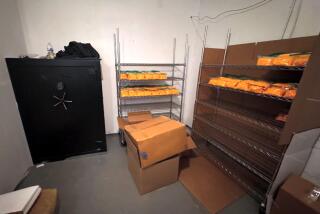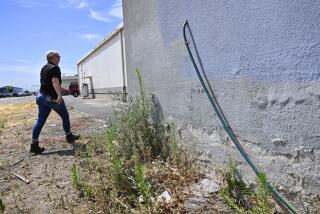FBI Ready to Battle Crime in Its New Lab
- Share via
QUANTICO, Va. — The FBI opened the doors Thursday to a $155-million crime lab that gives the bureau state-of-the-art technology for forensic police work ranging from the latest DNA matching to analysis of muddy shoeprints.
The lab, seven years in the making, is another step in the FBI’s recovery from allegations of shoddy science and poor worker performance, officials say.
The building’s 650 workers are spread over five floors that cover more than 460,000 square feet, double the lab’s size at its old headquarters in downtown Washington, D.C.. The lab is on the campus of the FBI Academy, its main training facility about 35 miles south of the capital.
For Dwight Adams, the lab’s director, the key change is that evidence and forensic work is now completely separate from the regular office, with a clean-air supply that cuts down on contamination and elevators to be used only to transfer items being examined.
“This building has been specifically designed for laboratory work,” Adams told reporters during a media tour of the facility, which FBI Director Robert S. Mueller III is dedicating today.
The lab has microscopes for DNA sampling and huge evidence bays where entire tractor-trailers and airplane fuselages can be pored over. There are thousands of samples of car paint for use in identifying vehicles and 5,000 firearms on hand for gun match testing.
The lab opening comes as the FBI continues to recover from allegations made by a whistle-blower in the mid-1990s about poor science, with an estimated 3,000 cases that may have been affected by the problems. One FBI lab technician has resigned for allegedly improperly testing 103 DNA samples, all of which are under bureau review.
There are also challenges to the bureau’s lead-bullet analysis capabilities, which led Adams to request an examination by the National Academy of Sciences. Adams said he is “very confident we have valid procedures” for analyzing bullets.
During the tour, Adams also said the lab’s quality assurance safeguards are top-notch and that he is stressing to employees that “their integrity, their performance ... is paramount to everything we do.”
“We’re not out to prove a thing,” Adams said. “We’re out to provide the truth.”
Perhaps the most important work the lab now does involves DNA, which has become a critical tool in solving crimes and exonerating the innocent.
The FBI lab processes about 1,200 DNA samples each year, with many more handled by 190 state and local labs around the country.
The FBI’s national DNA database includes 1.4 million profiles of convicted offenders. In 2002, that database provided almost 5,000 matches to samples taken from crime scenes, closing many previously unsolved cases and freeing police to pursue other crimes.
For all its high-tech wizardry, the lab also deals with the tried-and-true methods of forensics, as workers will process nearly 250,000 fingerprints a year.
More to Read
Sign up for Essential California
The most important California stories and recommendations in your inbox every morning.
You may occasionally receive promotional content from the Los Angeles Times.










